When Comets Collide: The Late-Night Supernova That Could Rewrite Television History
For decades, late-night television has been the beating heart of American pop culture—a nightly ritual of jokes, interviews, and monologues that both reflected and shaped the national mood. It was the place where Johnny Carson became a legend, where David Letterman reinvented irony, where Jay Leno fought for dominance, and where countless hosts tried, and often failed, to leave their mark.
But what is unfolding now—what industry insiders are whispering about with both awe and dread—may well be the most seismic event in the history of late-night. Imagine five blazing comets streaking across the universe, colliding in a spectacular explosion to form an entirely new galaxy. That is the scale of what has just happened:
Their partnership is not just another gimmick. It is being hailed as a cataclysm, a revolution, and perhaps the death knell for the old order of late-night television. To understand the magnitude of this moment, one must look not only at the stars themselves but also at the crumbling empire they are poised to replace.
The Titans of Late-Night: Why This Alliance Matters

Each of these hosts represents a unique gravitational force in the late-night cosmos:
-
Stephen Colbert, once the king of political satire on
The Colbert Report, now dominates CBS’s The Late Show. He wields sharp wit like a rapier, skewering politicians with a mixture of intellect and absurdity. -
Jimmy Fallon, the playful showman of
The Tonight Show, embodies the lighthearted, musical, and viral spirit of late-night. He turned silly games with celebrities into a cornerstone of pop culture, proving that laughter can be both goofy and golden. -
Seth Meyers, with his cerebral bite on Late Night, has become the modern-day heir to Weekend Update, delivering sharp political monologues with the precision of a scalpel.
-
John Oliver
, HBO’s iconoclastic truth-teller, has elevated comedy into investigative journalism with Last Week Tonight. He doesn’t just entertain—he educates, persuades, and mobilizes audiences in ways no late-night host ever dared. -
Jimmy Kimmel, now temporarily silenced by industry and political battles, has been the emotional heart of the group, a man unafraid to shed tears on-air, blending humor with vulnerability in a way that resonates with millions.
Individually, they command empires of influence. Collectively? They may have just created something unstoppable.
Why Networks Are Panicking

Behind the glossy sets and the scripted laughs lies a ruthless battlefield. For years, networks have competed for the shrinking late-night audience. Younger viewers drifted toward streaming platforms and YouTube clips. Ratings wars that once drew tens of millions now struggle to break a fraction of that.
Executives clung desperately to their shrinking empires, hoping tradition would keep the lights on. But this new alliance threatens to rip the floor out from under them.
Insiders describe the mood in boardrooms as
The fear isn’t just ratings. It’s cultural dominance. If these titans can combine their audiences, they don’t just win the night—they redefine the medium.
What This Means for Comedy
Late-night has always been more than jokes. It’s been a mirror of America’s soul.
-
In Carson’s time, it was a warm blanket—comforting, apolitical, safe.
-
In Letterman’s era, it became ironic, edgy, and irreverent.
-
With Jon Stewart and later Colbert, it turned into a tool of political resistance.
Now? We stand on the brink of a comedy revolution.
This alliance has the potential to blend the best of all worlds: Fallon’s joy, Colbert’s wit, Meyers’ intellect, Oliver’s rigor, and Kimmel’s humanity. It could create a platform that not only entertains but mobilizes, educates, and inspires—something late-night has never fully achieved.
For comedians, it’s a golden age. For politicians, it’s a nightmare. For audiences, it could be the most thrilling chapter yet.
The Silencing of Kimmel: A Catalyst
Perhaps the most intriguing part of this alliance is the inclusion of Jimmy Kimmel, whose recent silencing has been the subject of speculation. Some say he was pressured by networks wary of his political candor. Others whisper of behind-the-scenes conflicts with advertisers who preferred their comedy sanitized.
But Kimmel’s absence has only fueled the fire. By joining forces with the others, he transforms from sidelined host to martyr of the cause. His silencing becomes a rallying cry: proof that late-night’s soul is worth fighting for.
The Old Empire Crumbles
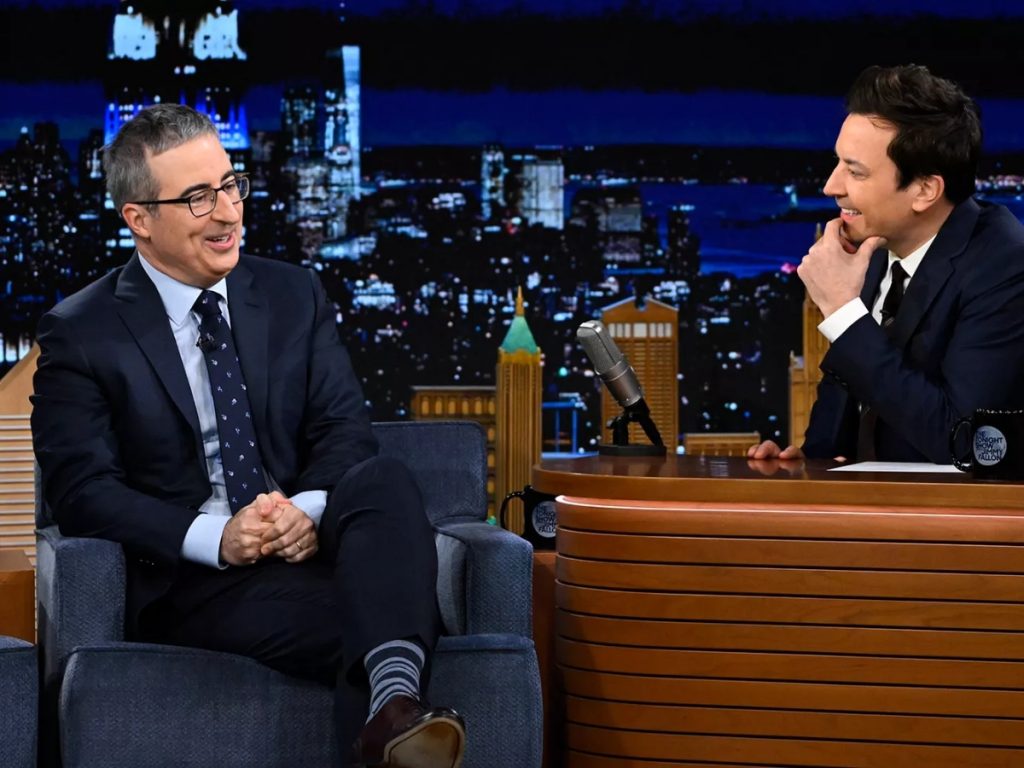
Every empire eventually faces its reckoning. For late-night television, the empire has long been built on routine: monologue, sketch, celebrity interview, musical guest. Night after night, year after year.
But empires crumble when they fail to adapt.
Streaming platforms have stolen away the younger generation. TikTok clips spread comedy faster than any monologue ever could. Audiences no longer wait until 11:30 p.m.—they want their laughs instantly.
The networks that once held power now look fragile, clinging to a model that feels increasingly ancient.
This alliance isn’t just a new show—it’s a new empire. One built not on network loyalty, but on talent, influence, and collaboration. And the guardians of the old order know it. That is why, behind closed doors, their whispers sound like panic.
Could This Be the End of Late-Night as We Know It?
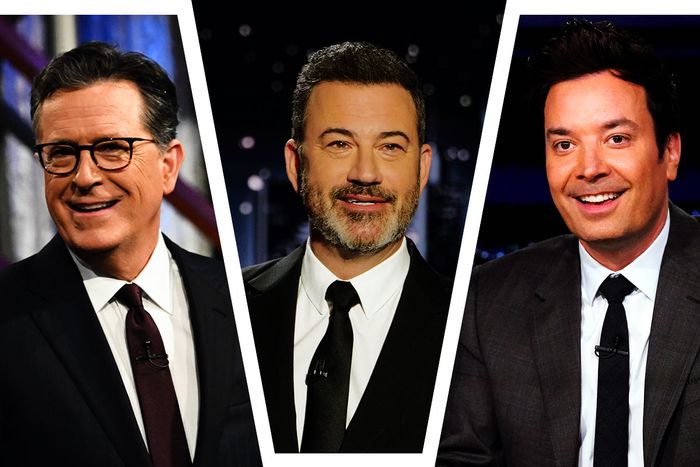
The question isn’t whether this alliance will succeed. The question is what it will destroy in the process.
Some predict that traditional late-night, with its stale format and rigid schedules, may collapse entirely. Others believe the networks will fight back, throwing money and power at younger, edgier hosts to reclaim relevance.
But one thing is certain: audiences will never see late-night the same way again.
Once you’ve seen Colbert, Fallon, Meyers, Oliver, and Kimmel together—once you’ve felt that gravitational pull—why would you go back to the fragmented, diluted version?
A Cultural Earthquake
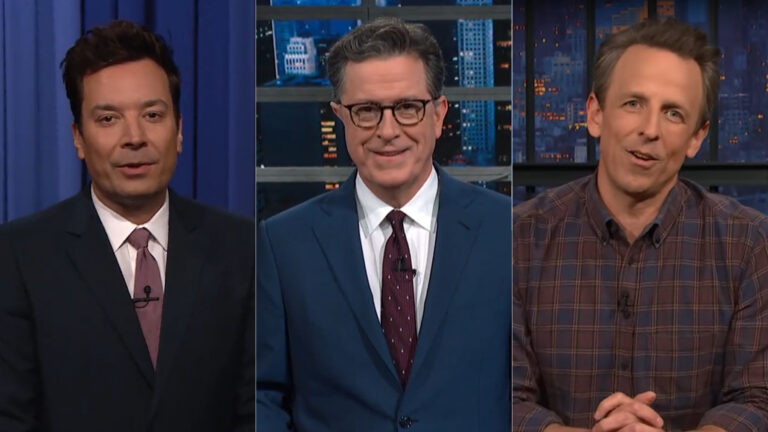
Make no mistake: this is not just entertainment news. It’s a cultural earthquake.
Late-night has always been where America laughs its way through pain. It has been where presidents are roasted, scandals are mocked, and history is processed in punchlines. When something big happens in the world, many don’t turn to the news—they turn to late-night.
If these five titans truly combine forces, they don’t just own comedy. They own the national conversation. They shape how we process reality itself.
Imagine their reach: millions on broadcast, millions more online, clips going viral worldwide. The jokes told in that alliance won’t just entertain—they’ll ripple through politics, culture, and history.
The Dawn of the Comedy Revolution
Revolutions don’t always arrive with gunfire. Sometimes, they arrive with laughter.
What we are witnessing is not merely the evolution of a genre, but the dawn of something entirely new. A late-night supernova, blazing across the cultural sky, leaving nothing untouched in its wake.
-
Networks will adapt or perish.
-
Politicians will either tremble or attempt to co-opt it.
-
Audiences will be swept up in the spectacle, unable to look away.
In ten years, we may look back and say this was the moment television changed forever.
Conclusion: The Empire Trembles
Right now, in boardrooms across America, the whispers are growing louder. Executives who once felt untouchable now wonder if their reign is ending. The guardians of the old empire stare into the abyss, terrified of what they see:
Five blazing comets, colliding, forging a galaxy that they cannot control.
A new order rising from the ashes of the old.
And in the laughter of millions, the sound of an empire crumbling.
The Warning Meghan Never Heeded: Why She Was Never Meant to Last
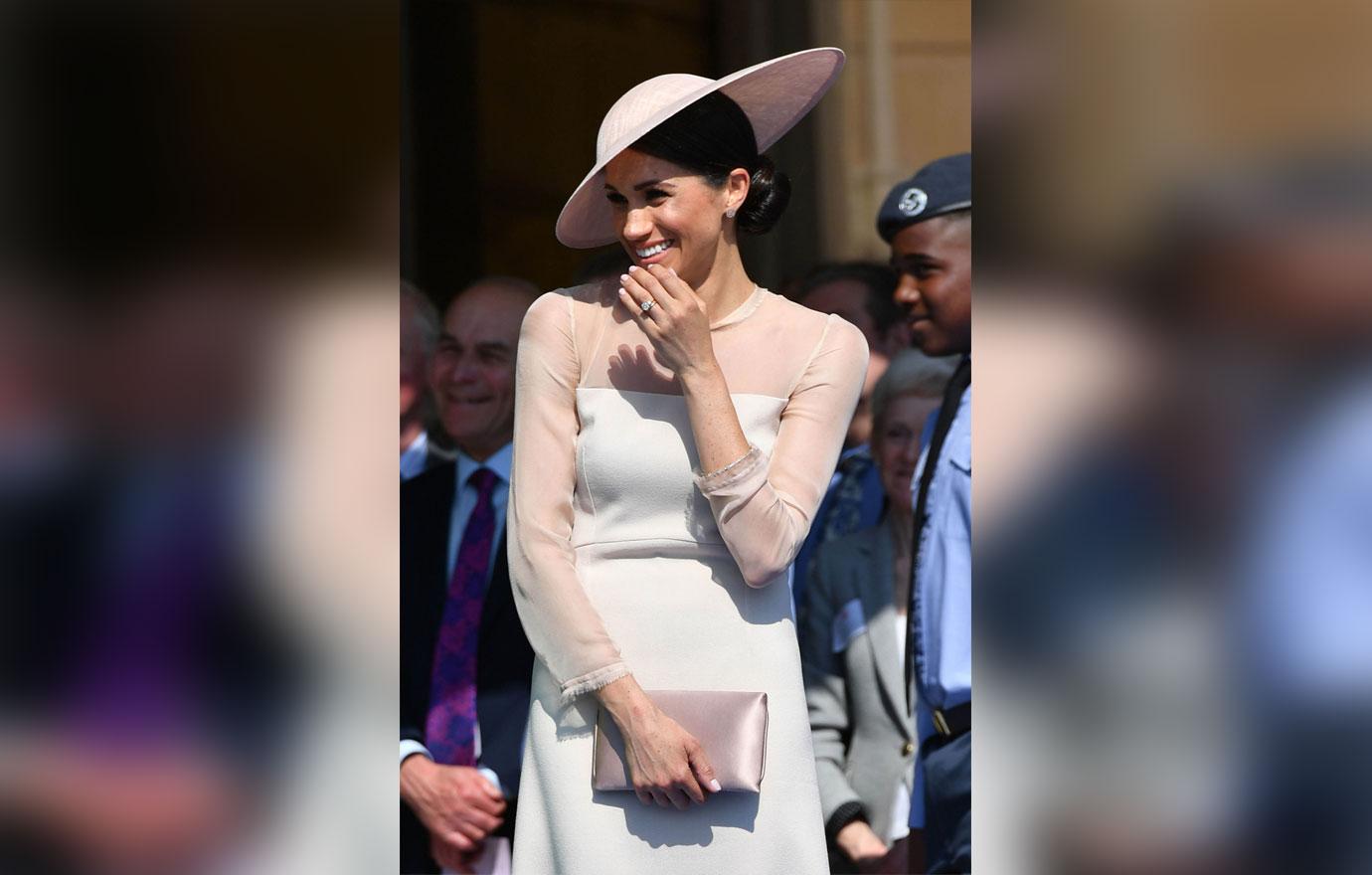

From the outside, joining the British royal family may seem like stepping into a world of luxury and privilege — castles, designer gowns, and endless adoration. But for those who have lived it, the truth is far less romantic. Life in the royal household is not a glamorous pastime; it is a role bound by duty, discipline, and the unspoken weight of centuries of tradition.
When Meghan Markle first entered the royal circle, she sought advice on how to adjust to her new life. There was guidance offered — the kind that comes from years of unwavering service, an unblemished record of hard work, and the quiet respect of the entire institution. But the response revealed something telling. The sparkle in Meghan’s eyes was not one of humility or dedication, but of ambition — the ambition to shape the role into something that suited her, rather than shaping herself to the role.
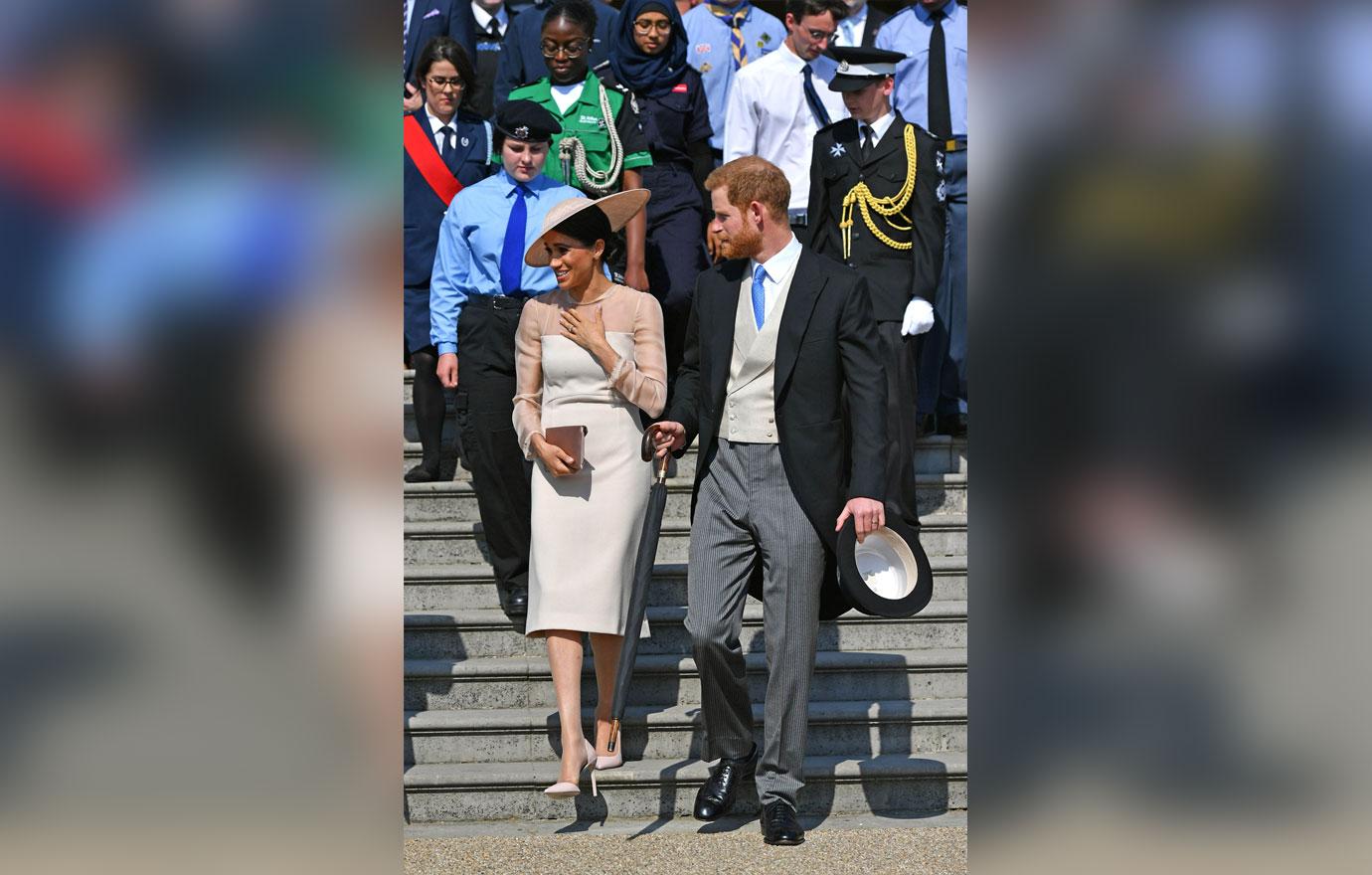
Those who understood the monarchy knew the warning signs. A successful royal must carry humility, as Catherine does, or possess the effortless charm that once defined Princess Diana. Meghan had neither. What she did have was a keen eye for style, a desire for the spotlight, and a belief that the castle walls could be her personal stage.
From the very beginning, there was doubt about how long she would endure. Behind closed doors, it was no secret that her priorities seemed misaligned with the demands of the Crown. Public duty requires putting the institution first — before comfort, before personal brand, before one’s own narrative. For Meghan, the allure of the role appeared rooted in image, not obligation.
And yet, there was no effort to push her away. One reason was Harry. Since the loss of his mother, Princess Diana, there have been those within the family who have felt a special responsibility to protect him — especially from further heartbreak. His longing for a complete and supportive family was well known, and no one wanted to be the one to dismantle the life he thought he was building.
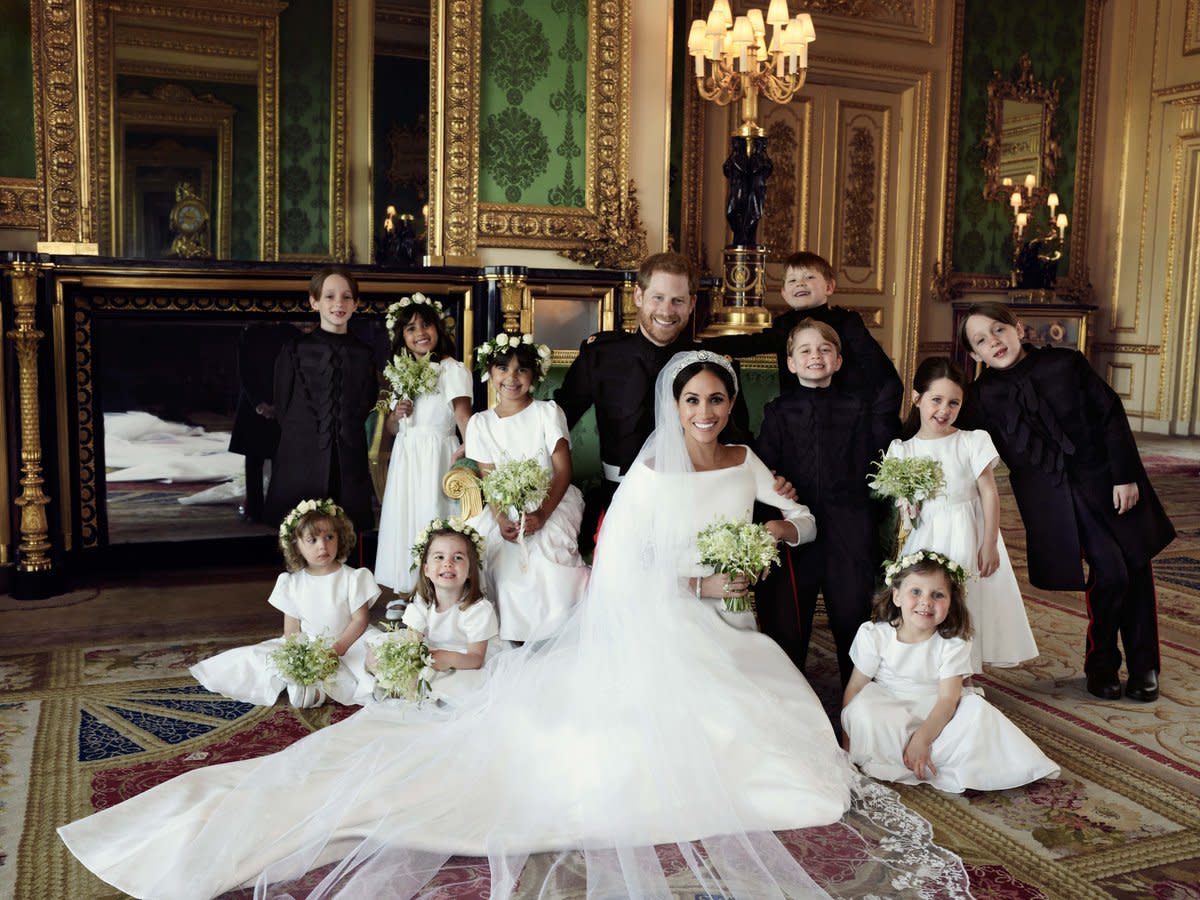
Still, there were moments when concern for the dignity of the monarchy came first. The Crown has weathered centuries of storms, from political upheaval to personal scandal. Its survival depends on the conduct of those who represent it. There was a quiet but resolute determination that the family’s image would not be tarnished by recklessness or disregard for its values.
But ultimately, the decision was Meghan’s. She chose her own path — and in doing so, she chose to leave, taking Harry with her. The exit was framed as liberation, an escape from the constraints of an outdated system. To the watching world, it was a royal rift. To those within, it was simply the conclusion they had long foreseen.
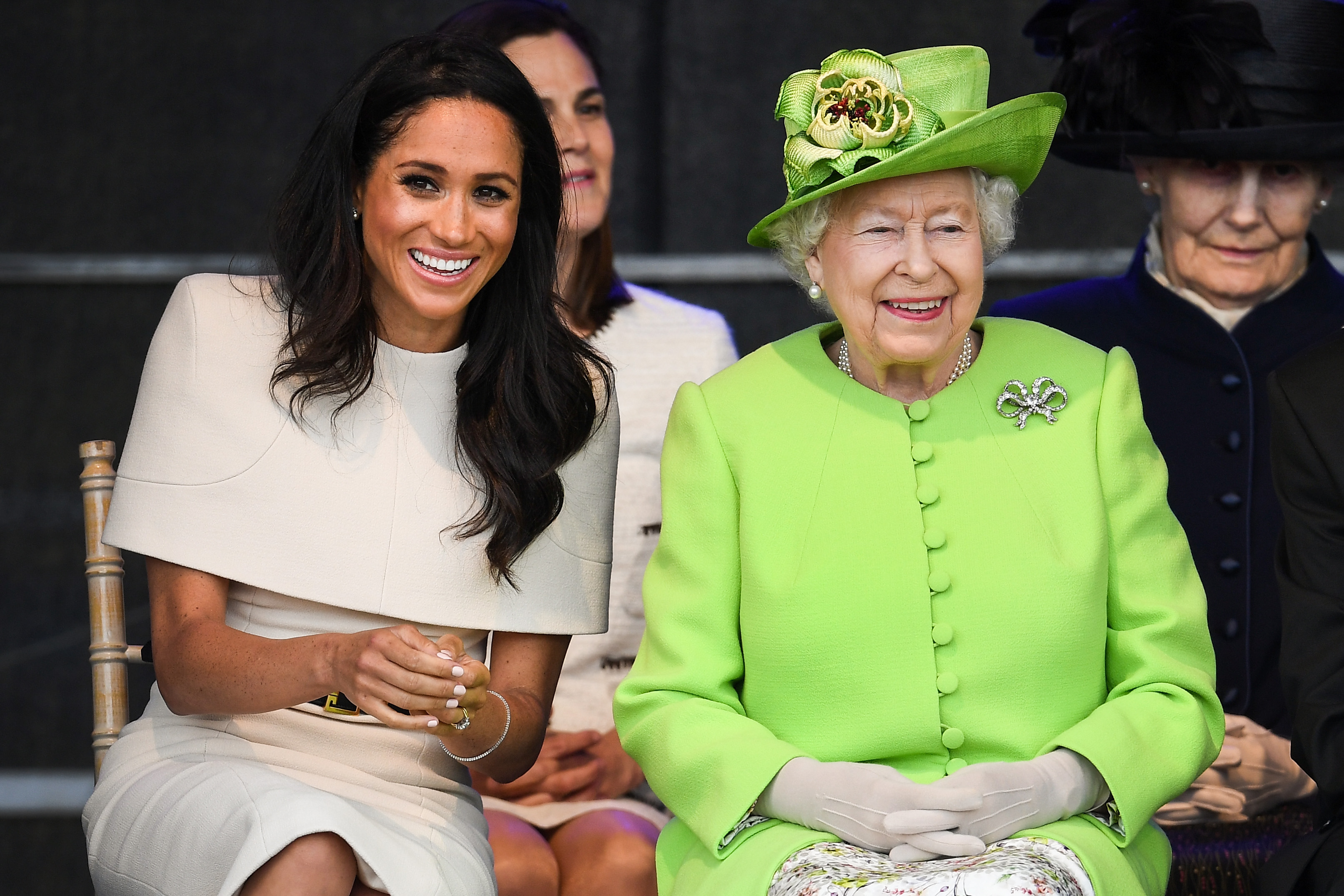
The tragedy is not in the departure itself — after all, not everyone is suited for royal life. The tragedy lies in the wasted potential, the opportunity to modernize the monarchy from within while respecting its foundations. Others have done it. Diana, in her way, redefined the role with compassion and vulnerability. Catherine has reshaped it with quiet strength and unwavering commitment.
Meghan, however, seemed unwilling to adapt. The title, the duties, the service — these were obligations to be endured, not embraced. And in the monarchy, where tradition and stability are the lifeblood of the institution, such an attitude is not just unsustainable; it is incompatible.
In the end, the royal family carried on, as it always does. The work continued, the public engagements resumed, and the image of the Crown remained intact. Harry and Meghan stepped into a different kind of spotlight, one of their own making, far from the palace gates.
And somewhere within the quiet halls of the monarchy, there remains the knowledge that the warning was given — not in bitterness, but in truth. Royal life is not a game. It is a calling. And those who do not understand that from the start will, inevitably, find their time in it short-lived.






